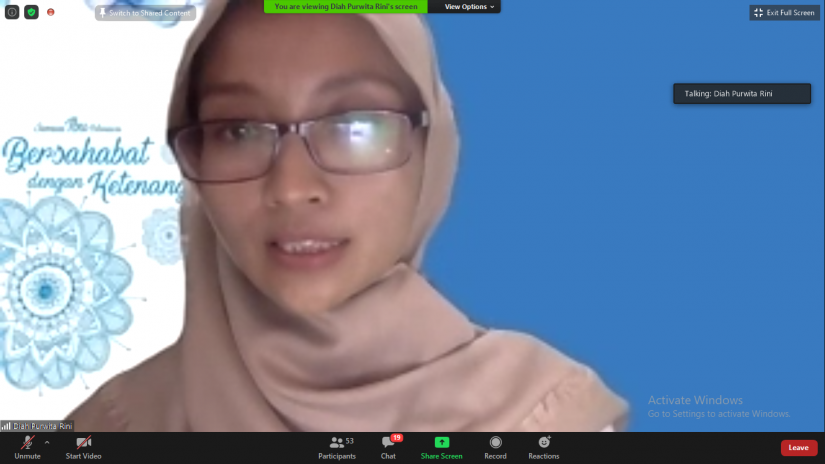
Yogyakarta, October 30th 2020—Celebrating the World Mental Health Day, Career Development Center (CDC) Fisipol UGM invited all the academics staff and members of Fisipol UGM to concern in the importance of mental health in the series of event of Mental Health Society that brought a theme ‘Surviving Pandemic: Mental Well-Being Through Digital Society’. There were three webinars in this Mental Health Society event that would discuss about mental health, career, and sexual violence.
This series of Mental Health Society 2020 was started by a talkshow about mental health titled as ‘Digital Well-Being: Coping with Anxiety, Insecurity, and Loneliness’ which presented two speakers, they were Nurul Kusuma, the Psychologist of Center for Public Mental Health (CPMH) UGM and Diah Purwita Rini as the Psychologist of Miracle Yogyakarta.
Nurul opened the discussion by talking about how to achieve digital well-being. “Nowadays, technologies are very helpful for us, but some problems could happen when we overused the technologies. In this pandemic era, we should be more aware about digital well-being,” Nurul said.
“The keyword for achieving digital well-being is an optimal balance between pros and cons of the online world. When we felt an urge to get the maximum positive things without losing our control,” Nurul explained.
Nurul said that there were many problems in this pandemic. “Because the usage of technologies gets higher in this pandemic time, we often get problems such as how long is the screentime. We were unaware that we became very dependent on our gadgets. The clear impacts are anxiety and depression,” Nurul explained.
Furthermore, the impact of imbalance in the use of digital technology can lead to cyberbullying, doxing, cyber victimization, to Fear of Missing Out (FOMO) which causes increased anxiety. For Nurul, an effective way to prevent and promote digital well-being is digital literacy to help navigate between digital and real life as well as to do well-being by design, for example creating a digital platform that promotes digital well-being.
Furthermore, the discussion was continued by Diah Purwita Rini regarding self-healing for academic optimization. “Currently, all of us are struggling to learn during the pandemic, we must empathize with each other for lecturers, students, and both,” Diah said.
Diah also described the challenges faced by the academic process at this time, including anxiety and depression that hinder students from learning, unequal digital technology skills, to the process of adapting behavior, psychosocial, and the environment which is quite difficult for students.
“Therefore, in the midst of the learning challenges we face, we need to practice mindfulness, which is a way to try to pay attention to self-suffering or pay attention to the present moment,” Diah said.
Mindfulness itself is one of the three components of compassion. “The key to a happy life is life compassion, which is realizing that we are currently confused, able to control ourselves, which will make us more resilient, have a strong resilience and can adapt to a pandemic, and even new creativity can emerge,” Diah said.
Apart from mindfulness, two other components of life compassion are kindness to treat oneself or others with care, and common humanity who sees the experience of yourself or others as part of a wider human experience.
Diah also said that in order to achieve balance, a self-healing effort was needed to heal inner wounds that could be achieved through three methods. First, the mindfulness method by paying full attention to thoughts, feelings, body sensations, and events that are being experienced. Second, the self compassion method by understanding one’s own condition, responding to the suffering experienced, and accompanied by a desire to help oneself.
Finally, reframing and cognitive restructuring methods are used to refram the meaning of events that cause suffering, then deliberately write a new, happier self.
Through a series of Mental Health Society 2020 events, CDC invited the entire FISIPOL academic community to always be aware of the importance of mental health. To find out information and participate in a series of Mental Health Society 2020 events, CDC provides the latest information which can be accessed via Instagram @cdcfisipolugm.
